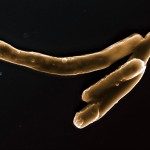Link to Pubmed [PMID] – 14755337
J. Clin. Invest. 2004 Feb;113(3):401-13
TNF-alpha has long been regarded as a proimmune cytokine involved in antimicrobial type 1 immunity. However, the precise role of TNF-alpha in antimicrobial type 1 immunity remains poorly understood. We found that TNF-alpha-deficient (TNF(-/-)) mice quickly succumbed to respiratory failure following lung infection with replication-competent mycobacteria, because of apoptosis and necrosis of granuloma and lung structure. Tissue destruction was a result of an uncontrolled type 1 immune syndrome characterized by expansion of activated CD4 and CD8 T cells, increased frequency of antigen-specific T cells, and overproduction of IFN-gamma and IL-12. Depletion of CD4 and CD8 T cells decreased IFN-gamma levels, prevented granuloma and tissue necrosis, and prolonged the survival of TNF(-/-) hosts. Early reconstitution of TNF-alpha by gene transfer reduced the frequency of antigen-specific T cells and improved survival. TNF-alpha controlled type 1 immune activation at least in part by suppressing T cell proliferation, and this suppression involved both TNF receptor p55 and TNF receptor p75. Heightened type 1 immune activation also occurred in TNF(-/-) mice treated with dead mycobacteria, live replication-deficient mycobacteria, or mycobacterial cell wall components. Our study thus identifies TNF-alpha as a type 1 immunoregulatory cytokine whose primary role, different from those of other type 1 cytokines, is to keep an otherwise detrimental type 1 immune response in check.

